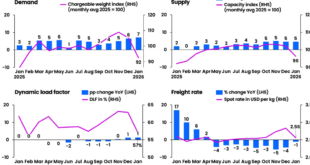Agreement on a 10% salary rise and a one-off £500 lump sum will mean that a long-term disruption to Royal Mail services is finally over.
Postal workers have accepted a deal negotiated between bosses and the Communication Workers Union (CWU) in the wake of industrial action which saw 18 strike days last year and walk-outs across the UK by 115,000 staff. Despite unresolved issues, no strike days were carried out this year.

Royal Mail said: “The agreement provides Royal Mail a platform for the next phase of stabilising the business whilst continuing to drive efficiencies and change.”
But while workers “overwhelmingly” backed the deal, the CWU has warned that anger at the firm “doesn’t end with today’s result”.
Royal Mail, which lost millions of pounds through the strikes, added: “The three-year pay deal agreed provides certainty for employees and ensures Royal Mail remains the industry leader on pay, terms and conditions.”
The changes will mean that median pay at Royal Mail is £32,465 a year, while average pay for a postal delivery worker is £25,777.
The company has also commited to no compulsory redundancies during the deal’s three-year duration.
CWC general secretary Dave Ward said the dispute had marked the “most challenging period in both the history of the union and the company”.
The result would signal the “start of the union reconnecting in every workplace”, he added, but warned: “Many workers simply do not trust Royal Mail Group because of the company’s lack of integrity and the way they are being treated.
With the traditional business of delivering letters declared as no longer profitable by Royal Mail, the company sees growth in the fast-growing world of parcel deliveries, driven by online retail activity.
But the company faces fierce competition from other couriers and in February it claimed it was losing about £1m a day.
Last autumn, business groups including the Federation of Small Businesses (FSB) implored the Royal Mail and the CWU to find a swift resolution, warning strike action was a “body blow” to SMEs.
Simon Briault, FSB spokesman, said: “It is not just about sending a few letters or parcels, it is about the whole economy. Research conducted by the FSB found 94 per cent of SMEs use Royal Mail exclusively and 89 per cent of them use the company every day. SMEs do not really have an alternative to Royal Mail.”


